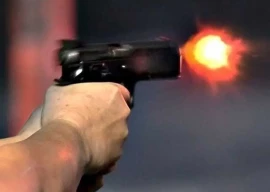An overwhelming majority of the fatal heatwave were poor residents of the city many of whom live on the streets and had no shelter to seek when the sun came burning down. Most of these poor residents were old, their bodies unable to withstand the intense heat. Combine old age and poverty with the fact that the electricity utility failed to provide uninterrupted power supply meant there was no respite.
A week after, Karachi deals with the aftermath of the deadly heatwave that killed over 1,200 people with several people still struggling for their lives at the overpopulated public hospitals.
Read: Majority of Karachi heatwave victims were homeless: minister
Waiting for paan
Nawab Ali, 60, breathes nosily, his bulky body moving up and down. There is an oxygen mask on his face and a yellow towel on his forehead. His son Khalid, who sits beside him, stares at him, solemnly. "This is how he has been since last Monday. There has been no improvement."
A week ago, it was very hot and there was no electricity at their house in Korangi No. 2 ½. Ali was sitting outside and fanning himself. "Paan lay kar ana," he asked Khalid to bring him betel leaf as his son was heading out to participate in a protest against load-shedding.
When Khalid returned with the paan, Ali had already gone to his room to sleep. "In the morning, when I went to see him, he was semi-conscious. His limbs were not working. He had vomited."
Ali, who used to work as a mason, was brought to Jinnah Postgraduate Medical Centre (JPMC), and was diagnosed with heatstroke, his brain nerves damaged and one side of his body paralysed. As he waits for his father to get better, Khalid only blamed the electricity utility. "Why is action only taken when something happens? We pay taxes, we pay our bills."
Pushing his luck
Muhammad Yusuf, 65, was sitting at home in Landhi with no electricity during the early days of the heatwave when he could no longer tolerate the heat. The frail, old man decided to take out his pushcart and sell chickpeas before Iftar. "I can't sit at home. I need to go out," he told his family. A few hours later, he came home with a 105°F fever and lost consciousness.
A week later, he lies on a hospital bed with his eyes open but his health deteriorating fast. "We asked for him to be shifted to the intensive-care unit but all the beds are occupied," cried his daughter-in-law Nasreen. "We cannot afford to go to a private hospital."
Read: Power cuts: Hundreds rally against load shedding, Karachi deaths
Mouths to feed
Irshad, a father of five, has spent the past week looking after his 70-year-old mother, Zareena, who is suffering from heatstroke, and going out to sell fruits to feed his children.
When the mercury rose to 44°C last week, Zareena decided to visit their niece, who lives two blocks away from their house in Orangi Town. "My wife told her not to go in the hot weather but she didn't listen," said Irshad. "Old people never listen."
When she returned home, she was shivering and had fever, which refused to go away. After two days, Irshad brought her to Jinnah hospital. "Never in my 45 years have I seen people die of heat. Maybe there was a virus."
Space to breathe
The head nurse at JPMC, Mauj Ali, who has been dealing with heatstroke patients, confirmed that nearly all the victims are from low-income families. "One of the reasons why they suffered heatstroke was that they had no electricity at their homes," he reasoned. "They live in small congested houses with less space and more people." Most victims were over 50 years old, he added.
Published in The Express Tribune, July 3rd, 2015.

1731570357-0/elon-musk-(1)1731570357-0-165x106.webp)
-(1)1717678110-0/Kendrick-(1)-(1)1717678110-0-165x106.webp)














COMMENTS
Comments are moderated and generally will be posted if they are on-topic and not abusive.
For more information, please see our Comments FAQ